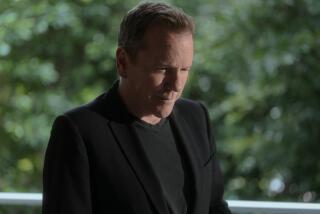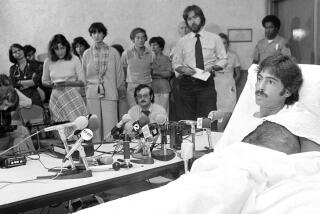MOVIES : The Hollywood Two : Director Edward Dmytryk named names--and paid a price. He wouldn’t act differently today, he says, but he wants to set the record straight.
- Share via
Still plenty hard-nosed, like one of his hellbent heroes, Edward Dmytryk isn’t ready to concede that he entered into the Hollywood version of a Faustian bargain to save his skin.
“Oh, God, that’s the way the left-wing journalists have always described it,” moans the 87-year-old filmmaker between classes at USC, where he teaches directing and editing. “That’s all bolshi talk.”
In November 1947, Dmytryk (then a brash young contract director at RKO) and nine others were summoned before the House Committee on Un-American Activities to answer questions about their association with the Communist Party. Determined to present a united front, they argued their 1st Amendment rights, virtually thumbing their noses at the inquisitors.
They were cited for contempt of Congress (a misdemeanor), fired by their respective studios, and handed prison sentences of six months to a year. They became known as the Hollywood Ten.
Two years later they were short one member. Dmytryk, who had left the Communist Party in 1946, further distanced himself from his fellow defendants in front of a second HUAC panel and, as a friendly witness, named names--26 in all.
That change of heart--on April 25, 1951--has been scrutinized and debated ever since. Dmytryk, who served six months in a West Virginia prison, said that he was rehabilitated and didn’t intend to “be a martyr for a cause I don’t believe in.” He went back to directing at the major studios, making such blockbusters as “The Caine Mutiny” and “The Young Lions” before retiring to write and teach in 1976. He is currently an adjunct professor at USC.
“I didn’t have a choice,” says Dmytryk, whose behavior during the period is retraced in his just-published “Odd Man Out: A Memoir of the Hollywood Ten” and an American Movie Classics special, “Blacklist: Hollywood on Trial,” to be shown Feb. 27. “The committee didn’t come to me, I came to them. That was a rock-bound prerequisite for getting clear of the blacklist.”
Volumes have been written about the Hollywood Ten (which, besides Dmytryk, included writers Dalton Trumbo and Ring Lardner Jr.) and the industry paranoia that ruined hundreds of careers. In most of these accounts, Dmytryk is portrayed as villain, the classic stool pigeon. His book (from Southern Illinois University Press) aims to “set the record straight . . . to tell it the way I saw it, the way it really was.”
It is not, he stresses, an apologia. Given the same set of circumstances today, he says, he would behave in a similar manner. In print, Dmytryk casts himself as dupe, rather than deceiver. He fully expects this spin to offend the media as well as surviving victims of the blacklist (including screenwriter-director Abraham Polonsky, who also teaches at USC).
“I wanted to get the facts on the table before the future historians had their say,” explains Dmytryk, still “a little tottery” after a spinal operation in October. “There was a lot of lying and dirt on both sides. There’s so much misinformation.”
The Big Lie, in Dmytryk’s opinion? That Trumbo, Lardner, Lester Cole, Alvah Bessie and the others “were all heroes, martyrs--that kind of thing. Which is a lot of crap. They made me think we were fighting for an ideal, which, it turned out, we weren’t fighting for at all. They said they were fighting for freedom of speech, the commonweal. They weren’t. They were protecting freedom of speech for the communists. They didn’t give a good goddamn about freedom of speech.”
The real victims of HUAC and the blacklist? “People on the ‘graylist,’ ” maintains Dmytryk, who was a member of the Communist Party for “about a year” before becoming disillusioned with Marxism in 1946. “People on the blacklist, like myself, walked into it knowingly. I have nobody but myself to blame. The people on the graylist--there must have been a couple of thousand of them--had done nothing but maybe donate money to Spain [during the Spanish Civil War].”
Dmytryk--whose career had just taken off with the noir hits “Crossfire” and “Murder, My Sweet”--fled the country in 1947, and continued to direct in Europe. Upon his return, he was imprisoned for six months at a minimum-security facility in West Virginia. Here, he reached the decision to cooperate with HUAC. A contrite Dmytryk renounced all ties to communism and, as a show of good faith, offered up the names of many associates, including “Crossfire” producer Adrian Scott.
“All but one of them had been named before--many times,” Dmytryk offers by way of justification. “I didn’t give them any new stuff.”
The new stance paid immediate dividends. Producer Stanley Kramer--recalled as “my savior”--hired Dmytryk to do the B-thriller “The Sniper.” Dmytryk went on to direct Kramer’s production of “The Caine Mutiny,” starring Humphrey Bogart as Captain Queeg. “Raintree County” with Elizabeth Taylor and Montgomery Clift and “The Young Lions” with Clift and Marlon Brando followed in 1957 and 1958.
Dmytryk was back in the game. But at what price?
He was now vilified by both the right and the left. Conservatives in the industry didn’t buy the seemingly overnight metamorphosis; liberals saw him as a disloyal opportunist. The press never missed an opportunity to label him “informer” and “rat.” Dmytryk’s wife, MGM contract player Jean Porter, also was a victim. Her career never recovered, though “she was completely apolitical.”
“I see myself as the odd man out--the only one of the 10 who got out,” says Dmytryk. “Ultra-liberals still consider me a rat. They say the thing about me is I ratted on my pals.”
Dmytryk pauses for effect, then adds, “None of these guys was a pal of mine. Not one. Not even Scott, with whom I made four pictures. They make them your friends, which makes it worse.”
Dmytryk recalls the West Virginia prison as “a camp with barracks and a timber mill, where the guards didn’t carry guns or clubs.” He was a factory clerk, in charge of vehicle maintenance. The warden--”a very, very nice guy”--brought the news that Dmytryk had won top honors at the Venice Film Festival (for “Give Us This Day”). Novelist Howard Fast, also serving time for contempt of Congress, was a fellow inmate.
Dmytryk came out of prison $500,000 in debt. Still, he felt like a stand-up guy: “I hadn’t taken the coward’s way out so I wouldn’t have to go to jail.”
A number of Hollywood acquaintances turned their backs on the Dmytryks when things looked darkest. Bogart, for one, proved something of a fair-weather friend. He went to Washington with Lauren Bacall, John Huston and Danny Kaye for the ’47 hearings, but then “cooled off.”
“Some people called him a traitor for that. He wasn’t. He was smart. He didn’t know what he was getting into. He wanted to get the hell out when he realized it was more than just a case of liberals vs. conservatives.”
French actress-activist Jeanne Moreau refused to work with Dmytryk on “A Walk on the Wild Side” (she was replaced by Barbara Stanwyck). Screenwriter-director Polonsky lost 20 years to the blacklist and, understandably, still refuses to talk to his fellow USC faculty member. Lardner, the only other living member of the Ten, is described by Dmytryk as “a damn fool, but a nice guy. I gather from interviews he doesn’t speak too highly of me.” (Lardner says he hasn’t spoken with Dmytryk in decades but is “curious to read his book.”)
Others in the industry have been known to turn a cold shoulder or cross the street when they see him. To this day, Dmytryk believes he was denied an Oscar nomination for “The Caine Mutiny” because “some people phoned around, saying, ‘Don’t vote for Dmytryk.’ ”
And then, of course, there are the reporters and film scholars. They will forever occupy a special point in Dmytryk’s personal Hades. “I can’t begin to tell you how unfair they’ve been.”
He points to a stack of film encyclopedias in the corner. In each, he’s dismissed as a once-promising studio hand whose work went downhill after the hearings. In some career evaluations, his “obsession” with turncoats (Fred MacMurray in “The Caine Mutiny”) is seen as symbolic, his fascination with physical deformity (Maximilian Schell in “The Young Lions,” Richard Widmark in “Alvarez Kelly”) read as an attempt to purge lingering guilt. Dmytryk concedes that his later films (“Shalako” with Sean Connery, “Bluebeard” with Richard Burton) are deserving of contempt. But what of the tightly crafted classics--”Hitler’s Children,” “Crossfire,” “Murder, My Sweet,” “The Caine Mutiny”? Why are they lumped with the clunkers?
“I made ‘Caine’ afterwards. I made ‘Lions’ afterwards. Most of my top pictures I made after I got out of jail,” he says. “I didn’t lose my sense of what the world is about, or what I wanted to say.
“My main point in the new book is that it wasn’t the conservatives who did us in, it was the liberals. Now the liberal critics dismiss me. My reputation is gone. Nobody talks about me when they talk about the great directors.”
To illustrate, Dmytryk shares a 1955 trade publication that trumpets “The Caine Mutiny” (released in ‘54) as the most popular picture of all time, over “Gone With the Wind” and “Casablanca.” In the same piece, Dmytryk is hailed as “one of the greatest directors of all time,” along with Wyler, Capra, Ford and Hitchcock.
“My greatest pleasure would be recognition from Hollywood,” Dmytryk says, choking back tears. “They pretty much have buried me. I’m not asked to the important events. [He received a Lifetime Achievement Award from San Luis Obispo Film Festival in November.] I taught at the American Film Institute. They’ve given awards to people with far less background, far less record of achievement, than I have. I turned Clint Eastwood [this year’s AFI Life Achievement recipient] down for a role in ‘The Carpetbaggers.’
More to Read
Only good movies
Get the Indie Focus newsletter, Mark Olsen's weekly guide to the world of cinema.
You may occasionally receive promotional content from the Los Angeles Times.










